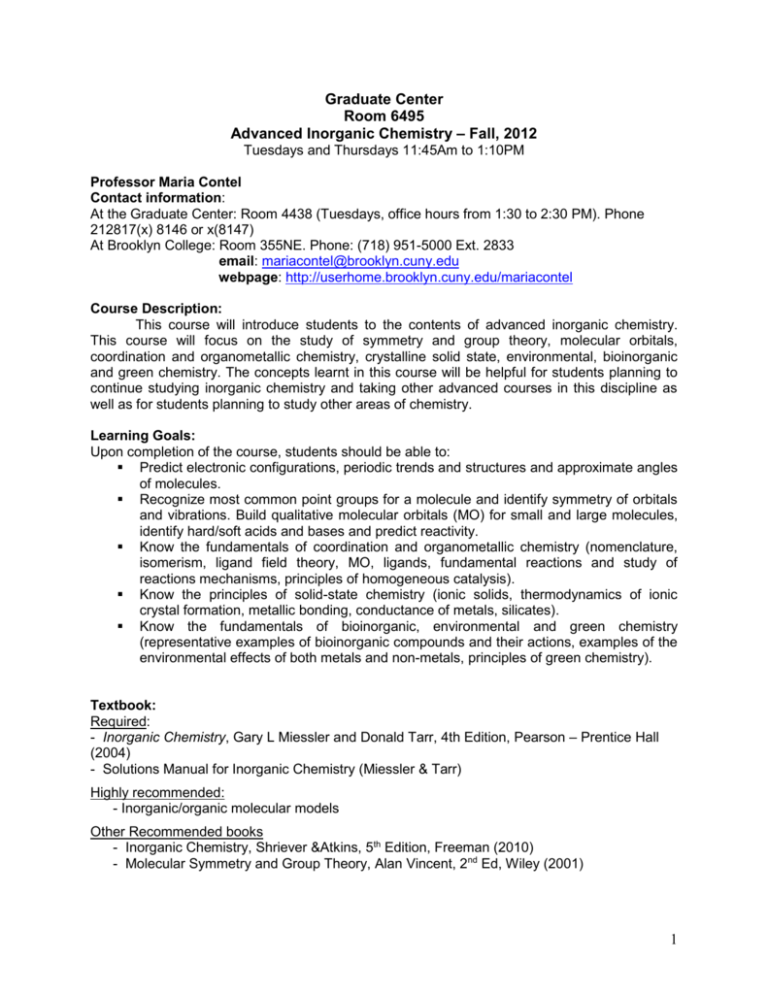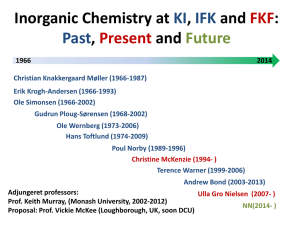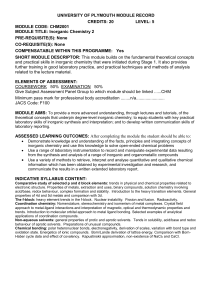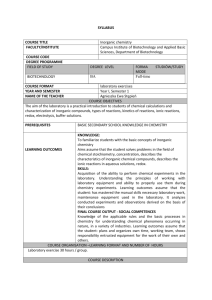
Graduate Center
Room 6495
Advanced Inorganic Chemistry – Fall, 2012
Tuesdays and Thursdays 11:45Am to 1:10PM
Professor Maria Contel
Contact information:
At the Graduate Center: Room 4438 (Tuesdays, office hours from 1:30 to 2:30 PM). Phone
212817(x) 8146 or x(8147)
At Brooklyn College: Room 355NE. Phone: (718) 951-5000 Ext. 2833
email: mariacontel@brooklyn.cuny.edu
webpage: http://userhome.brooklyn.cuny.edu/mariacontel
Course Description:
This course will introduce students to the contents of advanced inorganic chemistry.
This course will focus on the study of symmetry and group theory, molecular orbitals,
coordination and organometallic chemistry, crystalline solid state, environmental, bioinorganic
and green chemistry. The concepts learnt in this course will be helpful for students planning to
continue studying inorganic chemistry and taking other advanced courses in this discipline as
well as for students planning to study other areas of chemistry.
Learning Goals:
Upon completion of the course, students should be able to:
Predict electronic configurations, periodic trends and structures and approximate angles
of molecules.
Recognize most common point groups for a molecule and identify symmetry of orbitals
and vibrations. Build qualitative molecular orbitals (MO) for small and large molecules,
identify hard/soft acids and bases and predict reactivity.
Know the fundamentals of coordination and organometallic chemistry (nomenclature,
isomerism, ligand field theory, MO, ligands, fundamental reactions and study of
reactions mechanisms, principles of homogeneous catalysis).
Know the principles of solid-state chemistry (ionic solids, thermodynamics of ionic
crystal formation, metallic bonding, conductance of metals, silicates).
Know the fundamentals of bioinorganic, environmental and green chemistry
(representative examples of bioinorganic compounds and their actions, examples of the
environmental effects of both metals and non-metals, principles of green chemistry).
Textbook:
Required:
- Inorganic Chemistry, Gary L Miessler and Donald Tarr, 4th Edition, Pearson – Prentice Hall
(2004)
- Solutions Manual for Inorganic Chemistry (Miessler & Tarr)
Highly recommended:
- Inorganic/organic molecular models
Other Recommended books
- Inorganic Chemistry, Shriever &Atkins, 5th Edition, Freeman (2010)
- Molecular Symmetry and Group Theory, Alan Vincent, 2nd Ed, Wiley (2001)
1
Grading: The final grade will be determined as follows:
Tests: 75% grade (37.5 % each)
There will be a final exam (25% of the grade) that is also the 1st Level exam that EVERY
STUDENT has to take. Students in the Inorganic Chemistry Sub-discipline need High Pass or
Pass. This exam is also graded by a second grader (a professor from the Inorganic Chemistry
sub-discipline)
Tentative schedule and dates (please keep in mind that the date for the final exam is a tentative
one)
Date
Material
covered
TEST 1
Oct 16th
Units 1 to 4
TEST 2
Dec 4th
Units 5 to 8
Final Exam
Dec 18th
Two parts: 1. Units 1-4
2. Units 5 to 8
No make-up tests will be given except in cases of documented legitimate reasons for absence.
In the event of an excused absence from the final exam, contact the course instructor
(mariacontel@brooklyn.cuny.edu),
departmental
secretary:
Diane
O.
Adebowale
(OAdebowale@gc.cuny.edu), and chemistry executive officer: Prof. Maria Tamargo
(tamar@sci.ccny.cuny.edu) as soon as possible.
Policy for Re-grades: There will be no re-grades allowed for exams.
Issues of Courtesy: Lecture will start as scheduled, at 11:45 AM. Please try to arrive on time,
with your cell phone, pager, and/or other electronic devices turned off. If you must arrive late to
lecture, please enter quietly, so as not to disrupt those who were on time and are listening
intently.
Reading
• This is an advanced course and students are expected to do a lot of work on their own.
Lectures may not cover all the contents in the textbook as listed below, but you will be expected
to know the assigned material. Questions and discussion during the lectures are strongly
encouraged. If you have difficulties, ask me on Tuesdays, I am here to help you. However, don’t
expect answers to chemistry questions by email.
• You will need to practice on book exercises on your own and check the solution manual.
• A lot of material will be covered in this course. Keep up-to-date. Read appropriate sections in
the textbook before the lectures. I will give you some scientific articles related to concepts seen
in class on selected sessions. Their reading/understanding is expected and some questions
related to these articles may come up in exams.
• The slides for the lectures as pdf documents as well as many other materials and media
resources can be obtained from my web site http://userhome.brooklyn.cuny.edu/mariacontel
after class. However keep in mind that to be successful in this course you should attend all the
lectures. We will work on problems in class and I will stress and highlight the most important
concepts that you need to master to pass this course.
2
Content and Tentative Schedule
Unit 1
Chapters 1-3. Introduction to inorganic chemistry. Revision of basic concepts of atomic theory.
Chapters 2-2.4 to 3. Periodic trends. Simple bonding theories. (part of this will involve selfstudy)
August 28th, August 30th
Unit 2.
Chapter 4. Symmetry and group theory. Applications to vibrational spectroscopy.
September 4 th, 6th, 11th, 13th
Unit 3.
Chapter 5. Molecular orbitals: general principles. Homonuclear diatomic molecules.
Heteronuclear diatomic molecules. Larger molecules.
September 20th, 27th, October 2nd, 4th (No classes on Tuesday Sept 18th and on Tuesday Sep
25th)
Unit 4.
Chapter 6. Acid-base and donor-acceptor properties.
October 9th, 11th
Test 1: Units 1-4, October 16th
Unit 5.
Chapter 9-11. Coordination chemistry. Nomenclature, isomerism, coordination numbers and
geometries. Electronic structure. Ligand field theory. Electronic spectra. Reactions and
mechanisms.
October 18th, 23rd, 25th, 30th, November 1st, 6th
Unit 6.
Chapter 13-14. Organometallic chemistry and catalysis.
November 8th, 13th, 15th, 20th (No class on Thursday November 22nd, Thanksgiving recess)
Unit 7
Chapter 7. The crystalline solid state.
November 27th, 29th
Tests 2: Units 5 to 7, December 4th
Unit 8.
Chapter 16. Elements of bioinorganic and environmental chemistry.
If time permits: Green Chemistry (materials provided by Prof. Contel)
December 6th, 11th
Final Exam-1st Level exam Tentative Date: December 18th
Part 1: Units 1 to 4
Part 2: Units 5 to 8
3








